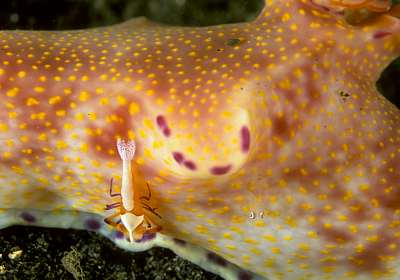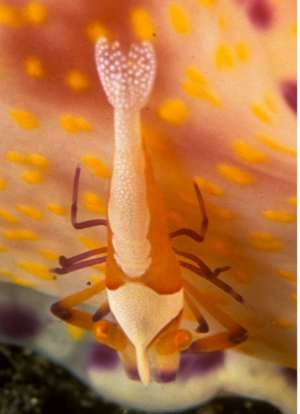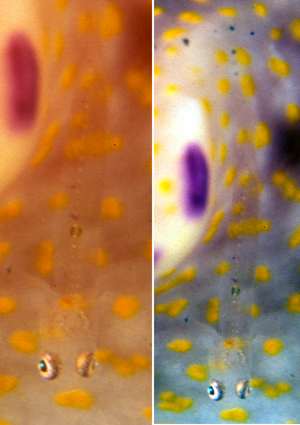Commensal fish on Ceratosoma trilobatum
June 27, 2005
From: John Weinberg

Dear Bill,
I have attached a scan of one of my slides of Ceratosoma trilobatum. After getting my slides processed I noticed that along with the shrimp, Periclimenes imperator, there is also a small fish apparently living happily. It is on the posterior edge of the left lateral lobe, slightly longer than the shrimp in a similar, head down pose. The fish is almost entirely transparent, the eyes being the most visible part, if you 'zoom in' it is possible to make out pectoral fins, the spine and a few bits of organs.It has gone to a lot of 'trouble' not to be noticed. Have you come across this before, and can you kindly tell me what fish it is? Is it commensal, the eyes could be said to match the yellow spots on the slug and it doesn't seem to be 'worried'? by any toxins from C. trilobatum.
Locality: North Sulawesi, Indonesia, Celebes Sea. Depth: 15 m. Length [of Ceratosoma]: 6 inches. June 2004. current swept black sand. Photographer: John Weinberg
Thanks for your help.
Regards
John Weinberg
john@e-scuba.co.uk


Dear John,
It's amazing what you can find when you look through your photos. I can't say I have noticed a fish like this before, but as you say it does a good job at staying unnoticed. I have included a copy of your photo [lower: far right] where I have altered the colour balnace to show your fish more clearly.
Your fish has caused great excitement amongst my fish colleagues here at the Australian Museum. I showed it to Mark McGrouther, the collection manager, and Doug Hoese, and expert on gobies who suggested it was probably a species of the genus Bryaninops, but suggested we contact Helen Larson, Museum & Art Gallery of the Northern Territory, Darwin, who is an expert on this group. Helen Larson has replied saying:
" - that's neat! I've collected Pleurosicya off holothurians, seapens and Tridacna but never nudibranchs. The fish may be a Pleurosicya, yes, but it has very wide-set eyes like Bryaninops. Mind you it's just a child, so is not easy to identify."
So what we can say is that it is a goby, a family of fish in which many have commensal relationships with other animals. It is also a juvenile, which may mean it will not stay with the nudibranch as it matures, but basically, like so much in the sea, we have a lot to learn.
Best wishes,
Bill Rudman
Related messages
-
Re: Another goby on nudibranch
From: Andy Eastwood, February 11, 2009 -
Amphipod crustacean mimic (Southern California)
From: Matt Segal, February 4, 2006 -
Ceratosoma with Periclimenes imperator
From: Corby James, September 17, 2005 -
Commensalism in Californian nudibranchs
From: James Lyle & Leslie Harris, July 30, 2005 -
Amphipod commensal on Tritonia festiva
From: James Lyle & Leslie Harris, July 30, 2005 -
Another commensal scaleworm
From: James Lyle & Leslie Harris, July 30, 2005 -
Re: Another goby on nudibranch
From: Bill Rudman, July 11, 2005 -
Another goby on nudibranch
From: Jerry Allen, July 5, 2005 -
Chromodoris coi with copepod
From: Fredy Brauchli, March 22, 2004 -
Mystery mark on Risbecia pulchella
From: Stephanie Maleady, January 25, 2004 -
It's a puzzle
From: Mary Jane Adams, May 10, 2002 -
Symbiotic stress
From: Ali, April 10, 2002 -
Ceratosoma trilobatum with commensal shrimp
From: Mary Jane Adams, September 21, 2001 -
Mutualism and symbiosis
From: Lindsay Jennings, January 24, 2001 -
Examples of Symbiosis
From: Sutha, August 23, 2000 -
Commensalistic Symbiosis
From: Josh Williamsen, March 24, 2000 -
Examples of endoecism
From: Sonia, December 9, 1999 -
Nudibranch with commensal shrimp
From: Erik Schloegl, November 14, 1999 -
Slugs and Microbes
From: Daniel Vega Mendoza, June 5, 1999 -
Information about commensalism
From: Kara Hailey, February 20, 1999 -
Commensalism
From: Kerry, January 18, 1999 -
Parasite and Mutualistic relationships
From: Tammy Pearson, November 21, 1998 -
"Commensalistic symbiosis"
From: Laura, October 30, 1998 -
symbiosis
From: unidentified enquirer, October 25, 1998 -
Symbiosis and commensalism
From: , March 28, 1998
